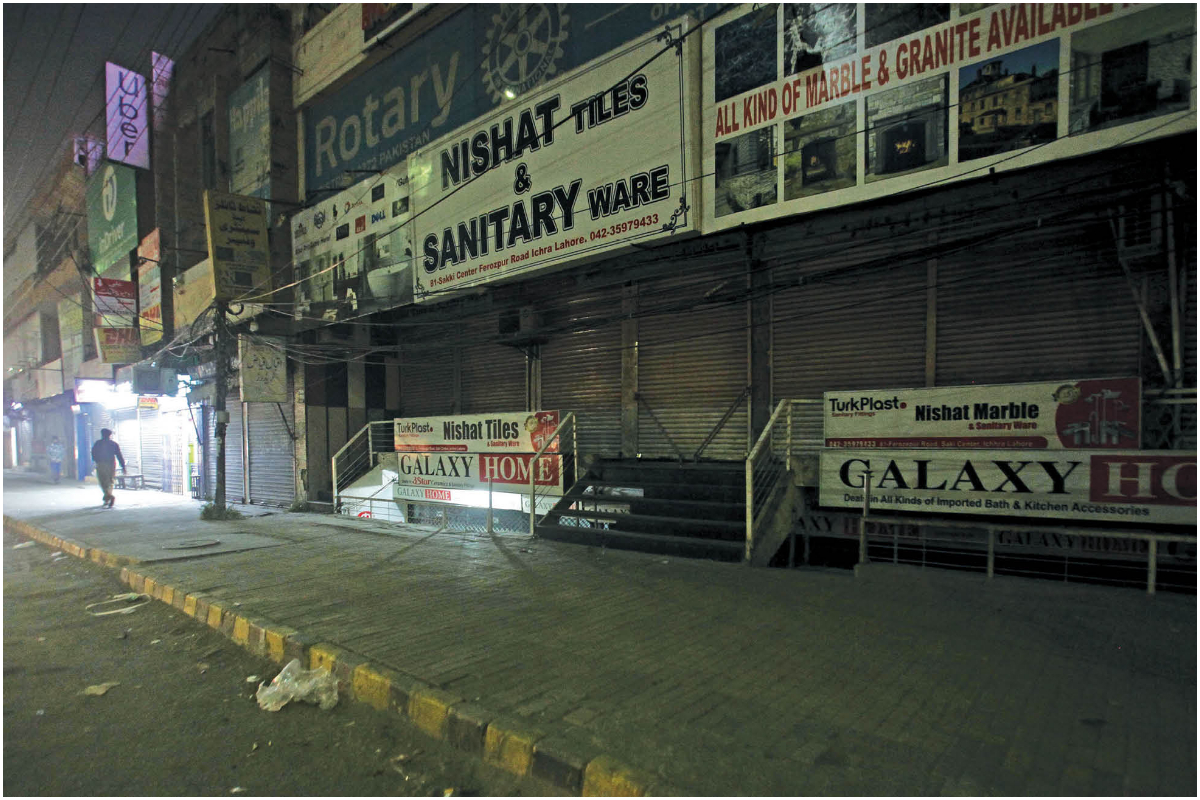
Right move at a wrong time
Traders decry early market closure amid the economic slump
LAHORE: The decision to control smog by closing markets, restaurants and businesses by 10 pm is rejected by the residents and businesses citing the financial crunch the country is going through these days.
Speaking to Bol News, Muhammad Umar, a roadside Burger Joint at Temple Road, said that the LHC’s decision to close our food points at 10 pm was the last nail in the coffin as we already find it difficult to make ends meet.
“I usually sell burgers and sandwiches starting 9 pm till midnight which are the peak hours of my work. Now the proposal to close markets by 8 pm to save energy is a threat to our survival,” he said in a sad tone. Umar believed that the majority of his clients come on foot or bikes and that doesn’t cause much of a pollution problem. “Secondly, how would my one bulb help in conserving energy? They may save energy by closing down high-end restaurants but not with roadside vendors like me,” he concluded.
Disagreeing with Umar, Environmentalist Maryam Shabbir Abbasi, said the biggest source of smog is the transportation sector. Closing markets early means controlling mobility on roads, which will help reduce smog, she added.
However, for her, it is not a long-term solution to this grave issue. In her opinion, provinces must agree to establish an air pollution control secretariat with a comprehensive strategy and members from provinces such as administration, industry, transportation sector, academia, civil society, and parliamentarians, all working solely on this issue.
“Clean technology, clean fuel, congestion charges, and carpooling are some of the ways forward to tackle this issue,” the environmentalist concluded.
‘Win-win situation for police and officials’
Ali Imran, a roadside soup and broth seller in Lahore Gulberg’s Main Market, said such decisions only help some police officials to mint money or get free meals from us and in return they let some of the roadside vendors operate with closed lights. In some parts of the city, roadside food points were seen operational even after 10 pm.
‘Not a good decision by LHC and Federal Govt’
Acclaimed Foodie Asad Sheikh, who runs a famous Facebook page named ‘Foodies are Us’, censured the decision of early market closure. They need to be clamping down on industries that cause pollution, not the BBQ. Crips burning and furnaces on ring road are major factors that are causing pollution and the restaurant industry is already hit with input costs which will result further in staff cutting or salary reductions. “Closing down everything is never the solution but shows how incompetent authorities are to implement rules,” Sheikh said.
‘Blow to Food and Beverages sector’
Asim Majeed, Managing Director of Second Cup – Pakistan said he is not sure about the environmental impact of the 10 pm closing, but lamented the rising input cost.
For him, the proposed energy conservation plan by the federal government lacks a sound understanding of issues faced by the business community in general and the restaurant industry in particular.
“We suffered the most during Covid-19 and lockdowns,” Majeed recalled.
He opined that the sector now grapples with an immense rise in input costs due to inflationary pressures and import challenges. Majeed maintained that the industry creates one of the highest employment amongst the middle-class sector and supports millions of households in Pakistan directly and indirectly, and yet stays vulnerable to poor government regulations and policies which could be best categorised as myopic.
‘Retail sector rejects energy consumption plan’
Asfandyar Farrukh, Managing Director of HUB leather and Co-founder of Chainstore Association of Pakistan (CAP) believed that the current smog-related restriction in Lahore limiting retail timings to 10 pm is a balanced measure which does not hurt revenues significantly.
However, he maintained, reducing retail timings by a further 2 hours during peak time to 8 pm is damaging for a compliant retailer. “Most people leave their offices at 6 pm thereby reaching their homes at around 7 pm when will they find time to shop?” he asked.
“In normal circumstances, families turn off their home lights and ACs when they visit malls and retail stores which use energy-efficient lighting and cooling technologies, whether day or night,” Farrukh said.
He recalled that earlier this year when conservation measures were notified, retailers suffered 25 to 30 per cent losses in revenue while energy savings were minimal. Under the newly proposed restrictions, malls will effectively stay open till restaurants close later at night even if retail outlets are shut early therefore almost the same electricity will be consumed,” Farrukh noted.
Moreover, he said that enforcement is limited to markets and establishments in prime locations only.
“Such uneven application defeats the intended purpose and benefits businesses in some areas at the expense of others, often through collusion with or lack of capacity of the law-enforcement authorities,” he pointed out. The government has claimed that there will potentially be a saving of Rs 62 billion each year against a loss of 3,600 billion rupees by closing retail establishments at 8 pm every day.
“In the already challenging economic environment, such a sharp drop in revenues will see many retailers inevitably resort to drastic cost-cutting through employee layoffs of a similar proportion,” Farrukh concluded.
Agreeing with Farrukh, Wasif Sikander Butt, CEO of Maria B, one of the leading fashion retail brands of the country said that 10 pm closure was not much of an issue and was somehow manageable at least for the retail sector but more of an issue is the proposed energy conservation plan of the federal to close down the retail and markets by 8 pm which would be a sort of the last nail in the coffin of the retail sector.
“With industry units closing down and declining exports, only retail was running but they decided to break its backbone too. I don’t know who gave such a brilliant idea to them to close retail at 8 pm,” he said.
Wasif claims that no one comes home before 7 pm from work and we can not shut down retail at 8 pm.
“When your whole import economy is on a grinding halt and we know that 2,500 containers are lying on seaports, think about non-perishable items,” he stated.
Butt believed that the retail sector of the country was already in a crisis because of supply chain disruptions.
“The retailers haven’t passed on the high increase in prices to the consumers and we’re taking a hit and some of them were at breakeven and some also booked temporary losses just to keep the local retail sector going,” he said.
Catch all the Urban Insight News, Breaking News Event and Latest News Updates on The BOL News
Download The BOL News App to get the Daily News Update & Live News.












 Read the complete story text.
Read the complete story text. Listen to audio of the story.
Listen to audio of the story.